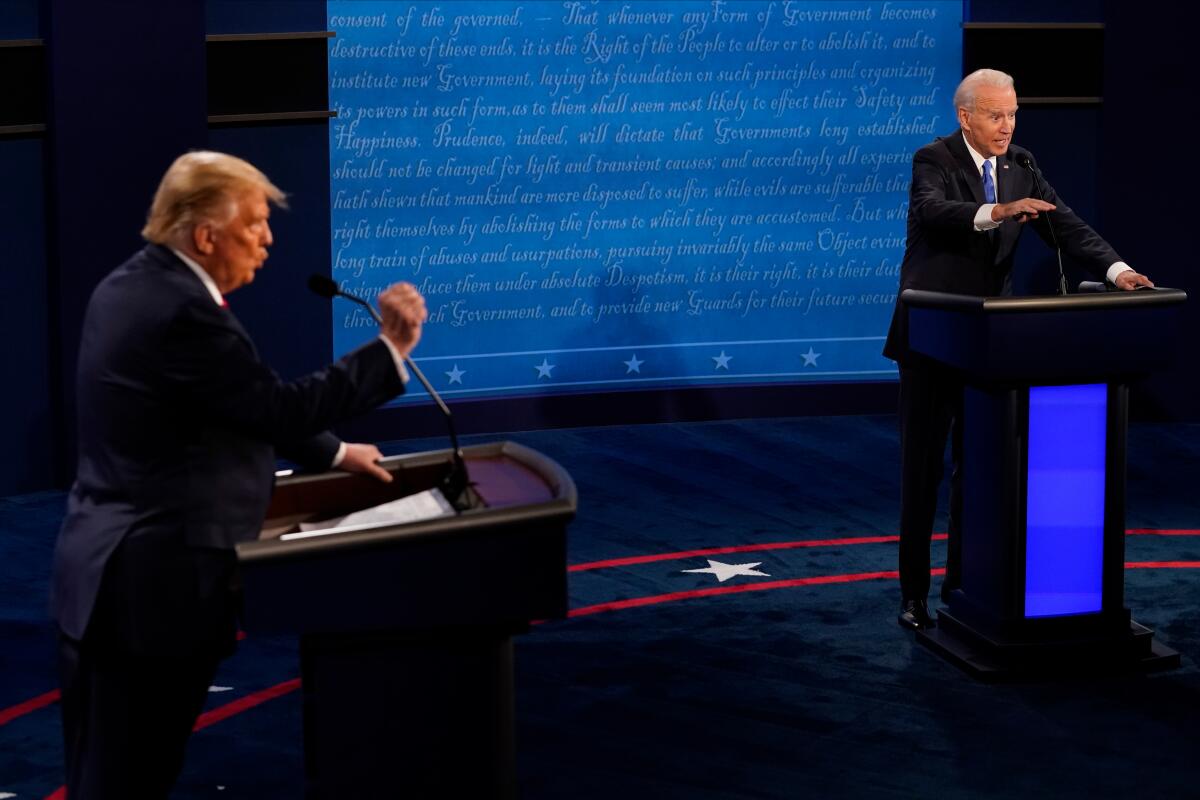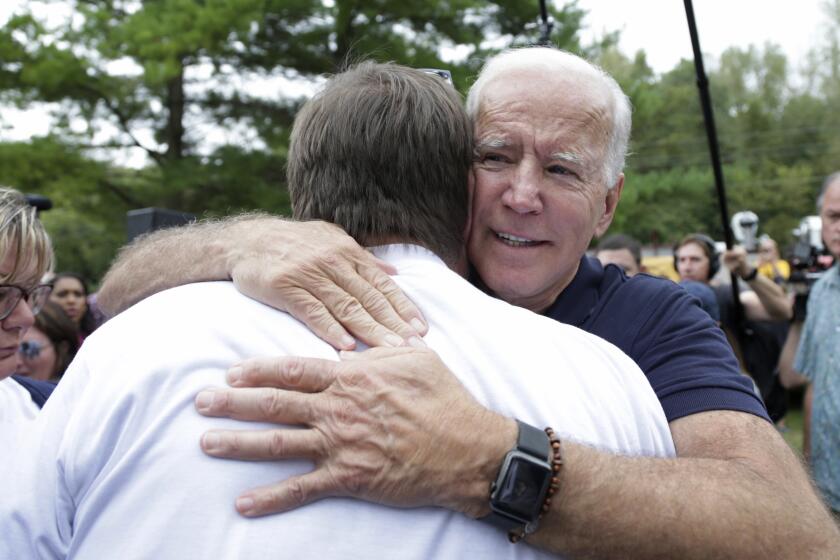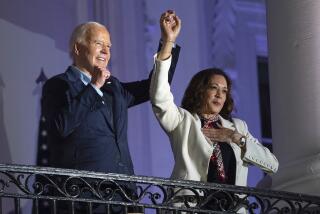Column: A lesson from Presidents Biden and Trump — the new normal is nonstop crises

- Share via
WASHINGTON — A poll published by the Economist this month included a finding that was striking yet unsurprising: Almost 7 in 10 Americans believe things in the country have spun out of control.
That’s a problem for President Biden, who campaigned in 2020 offering a return to normalcy after four years of chaos under Donald Trump.
Biden promised, in effect, to Make America Normal Again, but “normal” never quite returned. The COVID-19 restrictions ended, but the ensuing recovery brought high prices and rising mortgage rates. Wars broke out in Ukraine and Gaza; protests erupted on college campuses. And domestic politics remained bitterly polarized; the bipartisan unity Biden promised to engineer remained out of reach.
“People are reeling from the sense that we can’t get going in the right direction,” said Celinda Lake, one of Biden’s top pollsters, relating sentiments from voters in focus groups. “They’ve been shocked by events they never expected: Afghanistan, the war in Ukraine, Gaza, even the wildfires in Maui and the collapse of the bridge in Baltimore.”
Unsurprisingly, Trump has responded by blaming Biden for everything and anything that goes wrong, from surges in illegal immigration to wars overseas.
Trump was asked whether the election would end in political violence if he lost. “It depends,” the former president said. Here’s what he meant by that.
“If I was president, [the Oct. 7] Hamas attack on Israel would never have happened, the war in Ukraine would never have happened, and we would right now have peace throughout the world,” Trump wrote on his social media account, an alternative history that — lucky for him — can neither be proved nor disproved.
The combination of adverse events and Republican attacks has taken a predictable toll on Biden’s image. The Economist poll found that 58% of Americans consider Trump a strong leader, but only 36% see Biden as strong. Biden scores higher on other qualities; most voters see him as more honest and more likable than Trump. But those attributes may not be as important to voters in an era of instability.
Of the topics critical to California’s future, the cost of housing beats almost everything. Yet it has never emerged as a defining issue in the state’s politics.
“When people feel uncertainty or anxiety, they are looking for strong leaders,” said Doug Sosnik, a political aide to President Clinton during his 1996 reelection campaign. “Trump’s narrative, plain and simple, is … to portray Biden as weak. If that’s what the election is about, Trump will win.”
The pro-Palestinian protests on college campuses, Sosnik added, “are reinforcing Trump’s existing narrative.”
Despite Trump’s claims, Biden can’t really be blamed for the wars in Ukraine or Gaza, much less wildfires or bridge disasters. Whether he should be blamed for inflation is up for debate, although inflation in the U.S. has been lower than in most other countries.
While Donald Trump is in court for his hush-money criminal trial, President Biden is making the case for a second term. What does he hope to deliver if he wins?
Still, in an era of economic and political volatility, the new normal is that there is no normal. And that makes every incumbent vulnerable to bad news on his watch.
Case in point: Donald Trump in 2020.
Four years ago, amid a pandemic, a recession and the discord that followed George Floyd’s murder by police, many voters blamed Trump — if not for causing the crises, at least for mismanaging them.
In a July 2020 Economist poll, 80% of Americans said they thought things in the country had spun out of control.
That’s why many voters swung to Biden, hoping he could end the chaos and restore order.
President Biden, in an election battle with Trump, touts the economy. Democratic strategists say the message is missing Biden’s big strength: empathy.
But some scholars have concluded that incumbency, once considered an advantage for a president seeking reelection, has increasingly become a burden — mainly because in an era of polarized politics, presidents get less deference from voters on the other side.
“In the past, Democratic voters might sometimes rally around a Republican president … and Republican voters might sometimes support a Democratic president,” political scientist Lee Drutman of the New America think tank wrote recently. Now, he added, “there is simply nothing Joe Biden could ever do” to win support from GOP voters.
Trump’s California-born advisor says he would deploy troops to blue states to seize undocumented immigrants, send them to camps, then expel them.
“No national political figure is nationally popular,” he added. “This is part of Biden’s problem. It’s not just about his age, or the economy, or his foreign policy.”
Despite voters’ sour mood, Biden and Trump appear evenly matched in most recent national polls. But two factors could move those numbers before election day.
One is the focus of the campaign. So far, it has largely been a referendum on Biden’s record. But the president and his campaign are trying to shift the lens toward Trump, turning the election into a “dual referendum” on both candidates.
“Remember when he told us, literally, inject bleach?” Biden said at a campaign stop last month, referring to one of Trump’s most memorable moments during the pandemic. (In fact, Trump didn’t tell anyone to inject bleach; during a White House news conference, he asked aides to investigate whether it would be an effective therapy.)
What if Trump’s hush-money criminal trial, with details on Stormy Daniels, Karen McDougal, the ‘Access Hollywood’ tape, is a cure for voters’ ‘Trump amnesia’?
In another appearance, Biden said Trump was “mentally unfit to be president.”
The other factor, of course, is events. A cease-fire in Gaza, a continuing decline in illegal immigration, a Federal Reserve decision to cut interest rates or a conviction of Trump in any of his four pending criminal cases could help Biden. A new spike in inflation, an upsurge of migrants, or riots at the Democratic National Convention in Chicago could boost Trump.
But neither candidate can credibly promise to deliver “normalcy” anymore. No matter who the next president is, voters will soon be disappointed that he didn’t return life to normal.
Depending on whom you ask, the federal immigration app CBP One is a solution to the border crisis, a human rights violation or a ploy to let anyone into the U.S.
More to Read
Sign up for Essential California
The most important California stories and recommendations in your inbox every morning.
You may occasionally receive promotional content from the Los Angeles Times.


















